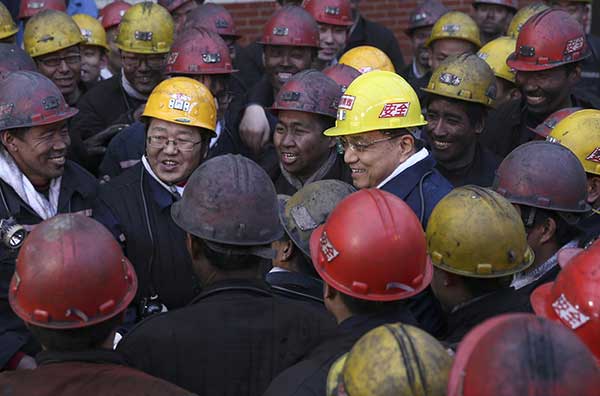A future in which coal does not rule the roost possible
Updated: 2016-01-12 07:50
By FU JING(China Daily)
|
||||||||
 |
|
Premier Li Keqiang talks to miners before entering the 300-meter-deep Guandi Coal Mine in Taiyuan, Shanxi province. He praised their hard work, saying the miners are "not only the backbone of Shanxi, but also the backbone of China".[Photo/Chinanews Service] |
Wearing a safety helmet and dressed as a coal miner, Premier Li Keqiang spent two hours in a coal mine 7, 000 meters below the ground with workers during his first inspection tour of 2016 in North China's Shanxi province, which boasts of a large coal reserve but faces economic problems because of overcapacity.
Apart from super vising work safety, Li also encouraged the coalminers, who are exposed to risks and disasters. The premier's bold gesture should herald the much-needed change in the industry.
I spent a few hours in a coal mine in a neighboring province 10 years ago. My visit to the coal mine was preceded by a deadly accident in a near by mine, and the report I filed focused on the hardships the miners had to endure in the dark tunnels.
In those days, coal mine accidents were quite frequent. According to official figures, coal mine accidents claimed the lives of 5,938 workers in 2005. In contrast, about 500 died in coal mine accidents in 2015. And in the previous year, 931 miners were killed in accidents in 500 of the about 11,000 coal mines in China. This shows coal mine safety has improved drastically over the years.
Despite this being an encouraging sign, however, there is no room for complacency because we are far from realizing the target of "zero death" in coal mines. Some Chinese safety regulators argue that the United Kingdom took about 70 years to make its coal mines "totally" safe, with the United States doing so in 60 years and Japan in 26 years.
Besides, the UK closed its last deep coal mine on 18 Dec, 2015, and now has 26 open cast mines in operation. But one cannot say with certainty when China will be able to close all its unsafe mines because coal is still the fuel of choice when it comes to generating electricity.
- Global health entering new era: WHO chief
- Brazil's planning minister steps aside after recordings revelation
- Vietnam, US adopt joint statement on advancing comprehensive partnership
- European border closures 'inhumane': UN refugee agency
- Japan's foreign minister calls A-bombings extremely regrettable
- Fukushima impact unprecedented for oceans: US expert

 Stars of Lijiang River: Elderly brothers with white beards
Stars of Lijiang River: Elderly brothers with white beards
 Wealthy Chinese children paying money to learn British manners
Wealthy Chinese children paying money to learn British manners
 Military-style wedding: Fighter jets, grooms in dashing uniforms
Military-style wedding: Fighter jets, grooms in dashing uniforms
 Striking photos around the world: May 16 - May 22
Striking photos around the world: May 16 - May 22
 Robots help elderly in nursing home in east China
Robots help elderly in nursing home in east China
 Hanging in the air: Chongqing holds rescue drill
Hanging in the air: Chongqing holds rescue drill
 2.1-ton tofu finishes in two hours in central China
2.1-ton tofu finishes in two hours in central China
 Six things you may not know about Grain Buds
Six things you may not know about Grain Buds
Most Viewed
Editor's Picks

|

|

|

|

|

|
Today's Top News
Liang avoids jail in shooting death
China's finance minister addresses ratings downgrade
Duke alumni visit Chinese Embassy
Marriott unlikely to top Anbang offer for Starwood: Observers
Chinese biopharma debuts on Nasdaq
What ends Jeb Bush's White House hopes
Investigation for Nicolas's campaign
Will US-ASEAN meeting be good for region?
US Weekly

|

|







